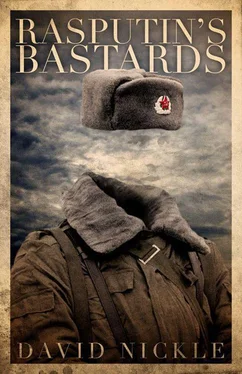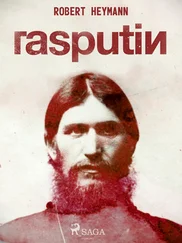Where, he was sure, he would find Kilodovich.
“How close are we?” he said.
“To leaving?” Bucci smiled. “I told you.”
“No.Youknow.TofindingKilodovich.YouhavebeenaskingtheQuartermaster there about Alexei Kilodovich, haven’t you?”
The smile vanished. Bucci leaned in close to Shadak. He put a hand on Shadak’s shoulder.
“Fucker did a real number on you,” said Bucci softly. “Didn’t he? Well don’t worry, Amar. We’ll make things right.
“You know what this place reminds me of?” said Bucci. “Marcia.”
“It reminds you of Marcia? Who is Marcia?”
“An old girlfriend,” said Bucci. “Great in the sack. But she had one problem.”
“What was that?”
“Thought she had psychic powers. The Sight .”
“Did she? Have the Sight, I mean?”
“Who knows?” said Bucci. “She said a lot of things that were true. But they were also things you could figure out by looking at a guy.” He thought about it. “So could go either way. Probably she wasn’t no psychic. But you couldn’t tell her that. She spent all her money on books and crystals and fuckin’ tapes — most months it was me that paid her fuckin’ rent and not her.”
“It sounds like a waste.”
“It was a waste I guess,” said Bucci. “But I think she used it. To keep out of serious shit. See, one day I finally got sick of her. Told her that was it — she was on her own, no more gifts no more nothing.”
“Hmm. What did she do?”
Bucci laughed. “She told me I had bad energy or some fuckin’ thing. She told me I didn’t know what I was saying and she knew because she could see the energy all around me.” Bucci fanned his fingers around his head and wiggled them. “All jaggly. She said I should fuckin’ meditate and I’d feel better about things.”
“Did you?”
“Fuck no. I left.”
Shadak looked at him sidelong. “She was not psychic,” he said. “If she was—” Bucci looked back. “If she was,” he said, “I still would have left. Wouldn’t have changed a fuckin’ thing.”
Shadak didn’t finish what he was going to say: If she was psychic, you would have been her fucking hand-puppet until she was finished with you, and when you left you would have taken away less than half of yourself. The rest would have stayed in her clutches until you died . Instead, he asked: “Do you think that Cloridorme is pretending to be psychic?”
Bucci leaned back and crossed his arms. “You know,” he said, “with the shit I’ve seen the past couple of days, I don’t think Cloridorme is pretending anything. I sure as shit don’t think New Pokrovskoye is playin’ a game here. I’m goin’ there because I said I would and I owe you from way back and I do what I say and I pay my fuckin’ tab. But you know something? In the end, I don’t think it means shit.”
“You have not met Alexei Kilodovich,” said Shadak.
“No,” said Bucci, “I have not. But we’ll see about meeting him soon. That fucker did a real number on you. I can tell. Soon as the boat comes. We’ll get on that fucker’s ass.”
And with that, Bucci stepped back inside.
Shadak peeked into his breast pocket — at the photograph there, of himself and Kilodovich — on the back of a jeep, grinning like fools. Shadak’s girlfriend had taken it — Ming Lei, with her long black hair and thighs smooth as silk. She was the kind of girl that a resourceful young hero like Amar Shadak ought to have three of. But Shadak, at just twenty-two still reeling at the responsibility of the shipment of small arms and mortar bombs that the Americans had dropped for him across the Pakistani border, one girl like her was enough.
Closer she’d said. Don’t worry — no one call you faggot, Amar. Cuddle up . And they’d laughed, and Alexei had thrown his arm over Amar Shadak’s shoulder like they were brothers — and she had taken the picture and handed it to him. He sat there, as the convoy started moving, watching the picture turn from creamy nothing into the instant of history, where Alexei Kilodovich embraced Amar Shadak as a brother.
He hoped that Bucci’s boat would do the trick. Shadak had acquired it for Bucci a couple of years ago from a cartel of Filipino pirates. It was one of a fleet of very useful little boats; it could pass muster in an only slightly well-oiled harbour. But given a half-hour’s notice, the deck gun could be up and assembled on the prow and the boat would be ready for combat. It was a good choice. Shadak thought that they might well have need of it.
Particularly, if Kilodovich was in charge of the force of men and women that were awaiting them.
He was sly enough to be. Particularly now that Fyodor Kolyokov was out of the picture.
They had first met in Quetta — during Shadak’s second and last meeting with Jim Saunders, his C.I.A. contact — the man who, at the time, Shadak saw as nothing less than his gatekeeper, to greatness. Kilodovich was lolling under a Banyan tree across from the café, sipping on a frosted bottle of beer and drumming his fingers impatiently on the wood of the bench. He was barely a man — skinny and pale, with close-cropped black hair and that unibrow, a little dusting of beard. He wore acid-washed blue jeans that did not fit him and a wine-coloured shirt with lapels wider than his chest. Shadak was not happy when Saunders had insisted that Kilodovich go along.
“The kid has contacts,” said Saunders.
“I have contacts,” said Shadak. “That’s why you hired me.”
Saunders had smiled that apologetic little half-smile of his. “We move in Soviet Afghanistan, we go with the Russian kid. Otherwise—”
He left it unspoken.
“Fine,” said Shadak. He had not yet worked with the Americans — and in 1985, if you worked with the Americans it was either Central America or Afghanistan. At that point Nicaragua was just a set of possible locations on young Amar’s mental map of the world. But Shadak had been doing heroin deals with certain Afghani parties since long before the Soviets had marched in. At that stage in his career where he could not afford to stand still, he could not afford to leave the American opportunity untapped.
At the time, Amar assumed that Saunders had given Alexei Kilodovich some kind of secret signal. The kid downed his beer and started immediately across the street. He was gawky and thin, but he moved even then with an easy confidence. He stepped around the low fence of the café’s patio and pulled up one of the plastic resin chairs.
He nodded hello at Shadak, who gave him a little smile in return.
“So we are going to be travelling together, da ?”
Shadak nodded. “So it seems. You know Afghanistan pretty well, I hear.”
“Not really,” said Alexei.
Shadak laughed. He had no idea, of course, that Alexei was telling pretty much the truth. He had never set foot on the lunar landscape of Afghanistan. He was along for another purpose.
Amar Shadak killed the next couple of hours wandering around the little town. The dawn light flattered it. If you squinted, and thought back to happier times, you might have imagined you were in a little French fishing village in the south — where you could while away the morning with a bottle of wine and some fresh-baked bread, before you climbed back into your Peugeot for the drive back to Paris and a night in the clubs.
Except of course you would never find a parking spot for your Peugeot here. The roads were all lined with cars. The town could probably build a hospital with the money it collected from parking tags this morning… .
Shadak wandered up the gentle slope from the harbour to the main streets. He walked past a gas station — still closed — a grocery store, a dark structure of corrugated steel and cinderblock filled with empty shelves and a couple of old video games. There were houses that crawled back further from the water, simple wooden buildings roofed in tar paper. Everyone in town seemed to have a truck, parked next to sleek, bullet-shaped little vehicles that Shadak understood to be snowmobiles. The houses were all dark, and as he walked he began to wonder whether the town was deserted. He thought back to The Omega Man , which made him think about the caves again, which made him wonder how well he’d do if the town rose up before him now — one terrible mind.
Читать дальше












